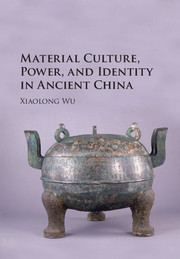Book contents
- Frontmatter
- Dedication
- Contents
- List of Figures
- List of Maps
- List of Tables
- Acknowledgments
- INTRODUCTION
- 1 HISTORICAL SETTING AND APPROACHES TO THE STUDY OF AN ANCIENT STATE IN WARRING STATES CHINA
- 2 LIFE, DEATH, AND IDENTITY IN ZHONGSHAN: SORTING OUT THE ARCHAEOLOGICAL EVIDENCE
- 3 ROYAL MORTUARY PRACTICE AND ARTIFACTS: HYBRIDITY, IDENTITY, AND POWER
- 4 INTERSTATE POLITICS AND ARTISTIC INNOVATION DURING THE REIGN OF KING CUO
- 5 STATECRAFT AND ZHONGSHAN BRONZE INSCRIPTIONS
- 6 FUNERARY ARCHITECTURE, KINGLY POWER, AND COURT POLITICS
- CONCLUSION
- Appendices
- Notes
- Bibliography
- Index
INTRODUCTION
Published online by Cambridge University Press: 23 March 2017
- Frontmatter
- Dedication
- Contents
- List of Figures
- List of Maps
- List of Tables
- Acknowledgments
- INTRODUCTION
- 1 HISTORICAL SETTING AND APPROACHES TO THE STUDY OF AN ANCIENT STATE IN WARRING STATES CHINA
- 2 LIFE, DEATH, AND IDENTITY IN ZHONGSHAN: SORTING OUT THE ARCHAEOLOGICAL EVIDENCE
- 3 ROYAL MORTUARY PRACTICE AND ARTIFACTS: HYBRIDITY, IDENTITY, AND POWER
- 4 INTERSTATE POLITICS AND ARTISTIC INNOVATION DURING THE REIGN OF KING CUO
- 5 STATECRAFT AND ZHONGSHAN BRONZE INSCRIPTIONS
- 6 FUNERARY ARCHITECTURE, KINGLY POWER, AND COURT POLITICS
- CONCLUSION
- Appendices
- Notes
- Bibliography
- Index
Summary
THE ZHONGSHAN 中山 (MAP 0.1) STATE OF THE WARRING STATES Period (476–221 BCE) was a small but potent state known only in sparse historical texts, some of which suggest that the Zhongshan was established by a “non-Zhou 周,” “non-Huaxia 華夏” group from the north. The Tang dynasty commentaries on the Shiji 史記 by Sima Zhen and Zhang Shoujie suggest that the state of Zhongshan was the continuation of the earlier Xianyu 鮮虞 founded by a group of the Di 狄 peoples called the Bai Di 白狄 or “White Di.” In his preface to a book on Zhongshan by the Qing Dynasty scholar Wang Xianqian (1842–1917), the scholar and reformist politician Guo Songtao (1818–1891) marveled at Zhongshan's ability to survive in the midst of powerful warring states through clever diplomatic maneuvers. Guo states that “in the rises and falls of the warring states, Zhongshan seems to be the unnoticed hub and linchpin.” This statement points out the perceived significance of Zhongshan in balancing the power relations among states of the middle Warring States Period. Zhongshan's significance in the multistate politics of the period can also be seen from the fact that it is the only small state to which the Zhanguo ce 戰國策 dedicated a whole chapter along with the seven largest states. In his own preface, the author Wang Xianqian also praised Zhongshan for its resilience and military might as a small state that was constantly threatened, frequently attacked, and sometimes conquered by the larger states but always managed to recover. One of the Zhongshan kings even successfully acquired the title of wang, previously reserved for the Zhou king, along with rulers of the seven largest states.
An exciting chapter on the study of Zhongshan came about in the late 1970s, when the excavation of the tombs of King Cuo (d. c.313 BCE) and his father King Cheng in Pingshan 平山 County, Hebei 河北 Province brought to light thousands of artifacts left by this enigmatic kingdom. These tombs are not only the first archaeological sites identified with the Zhongshan, but also the richest find from the highest strata of society from all states during the fourth century BCE. In the ensuing years archaeologists also located the Zhongshan capital, Lingshou 靈壽, one mile to the east of King Cuo's mausoleum.
- Type
- Chapter
- Information
- Publisher: Cambridge University PressPrint publication year: 2017



